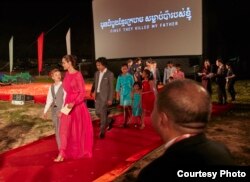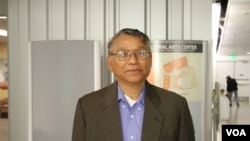After its premiere in Cambodia in early September, “First They Killed My Father”, a critically acclaimed feature film portraying a child’s eye view of the Khmer Rouge period, won over the audience at a screening in Maryland.
The Hollywood movie, directed by Angelina Jolie and produced by renowned Cambodian director Rithy Panh, based on a memoir by Khmer Rouge survivor Loung Ung, was the first Hollywood film to be shot entirely in the Khmer language in Cambodia.
Upon viewing the film, many at the Cambodian screenings wept openly at its portrayal of the Khmer Rouge regime’s brutality -- the forced labor camps, starvation, and executions -- but applauded when the film ended on a hopeful note.
At the screening in Montgomery College, Silver Spring, on the outskirts of Washington, DC, viewers commented on the movie’s distinct “visual vocabulary” and the bond between hope and despair in one of humanity’s darkest hours.
“Arts and creativity is one possible way that people can overcome and transcend the terrible pain and emotional disaster that one would face after dealing with that kind of things that happened during the Khmer Rouge,” said Joel Gershon, a filmmaker who appeared on a panel after the screening to discuss the movie.
He added that he had been “consumed” by the protagonist, a young girl named Loung.
“You try to connect to the audience that doesn’t speak the language and you got to have that emotion, the fear, the panic, confusion that you can see on Loung’s face, the young girl,” he said.
“There is a time where you can see in the eyes of Loung, that fear of not knowing where she’s going next. Not knowing where life will take her. I think that does get communicated without words being necessarily said,” Gershon added.
“The trauma of what happened during that time period can’t really be explained in a two-hour movie, especially when it’s supposed to entertain,” he said. “People don’t want to be completely depressed. They want to see something in the end that gives them some hope.”
Dr. Alfred Munzer, a genocide survivor, and pulmonologist said the film had vividly recreated the events of 1975-79.
“Telling the story through the eyes of a young girl, I think it’s very powerful. She really stands for us. She is the next generation in a way,” he said.
“What it shows very visibly is how one person can turn against their kin -- people who are related to them within the same country. It’s powerful and it’s very difficult to understand.”
Vietnamese Troops ousted the Khmer Rouge from Cambodia’s capital city of Phnom Penh on January 7, 1979 -- about three years after the Khmer Rouge takeover.
Ben Bao, president of Cambodian Community Day, a community network in Washington, DC, said he thought there were some flaws in the film, as it portrayed anti-Vietnamese sentiment among the Khmer people, rather than focusing exclusively on the suffering of Cambodians.
Pin Phounam, a student who played a stunt artist role in the film, said: “I believe in Cambodia everyone has a story to tell, however different and sad. Loung’s is just one story among the hundreds of stories of those whose relatives were killed.”











